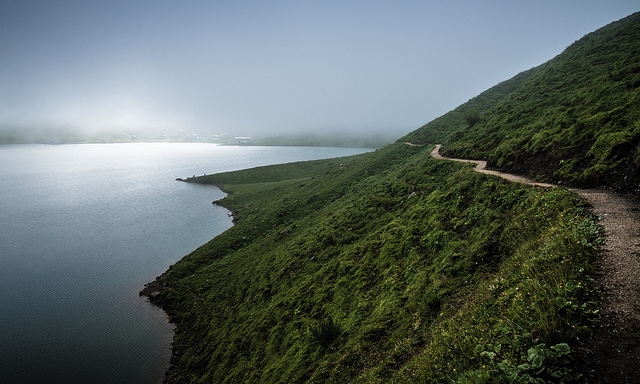In 2012, I nearly convinced a friend to run a 6 day, 120 mile trail race in the Rocky Mountains that reaches an altitude of over 12,500 feet.
That race is the Transrockies Run, a mostly singletrack ultra that includes nearly 20,000 feet of elevation gain.
Needless to say, it’s a daunting endeavor. And it never happened because my friend is scared of running at those altitudes. I don’t blame him – running 20 miles a day through the mountains for six days is hard enough without being over 2 miles above sea level.
That race would have been my first foray into the world of ultra running – and I’m glad it never happened.
I’ve never run further than a marathon and have no idea what it feels like to be on your feet for longer than 2 hours and 50 minutes (my slowest marathon from last spring). How would I have trained for the rigors of a multi-day ultramarathon?
Instead of starting with a 50k and moving up from there, I wanted to dive headfirst into the ultra world with no background in running super long distances. Missing the Transrockies Run was a blessing in disguise.
Running your first ultra shouldn’t be as difficult as a 120 mile stage race through the mountains. In fact, it should be about the same level of difficulty as your first marathon.
With the right ultramarathon training plan and a little luck, you can finish your first ultra within a year.
And while I’ve written many training programs for 50k up to 100 miles, my personal experience is very limited. So I brought in my friend Doug Hay to talk about how to get started with ultramarathons.
Doug Hay on Ultra Running for Beginners
Doug is the founder of Rock Creek Runner and a multiple ultramarathon finisher, having completed numerous 50k – 50 mile races. He’s currently preparing for his first 100-mile race.
He is also the author of Discover Your Ultramarathon: A Beginner’s Guide to Running an Ultramarathon, a guide on how to run your first ultra with training plans for 50k and 50 miles and several interviews with other top ultramarathoners.
A few weeks ago I met Doug for drinks and told him that we had to do an interview. I rarely write about ultras and wanted to share his experiences.
Like “fastpacking” 102 miles through Shenandoah National Park in only three days. That’s a 50k ultra every day for an entire long weekend.
I’m fascinated by the endurance needed to complete feats like this. Even though I’ve run what many might consider “fast” times for longer races like the half marathon (1:13) and marathon (2:39), I still think an ultra would be incredibly challenging.
But Doug’s approach is different. He nonchalantly acknowledges that ultra running is hard – but so is a marathon. Hell, even a 5k can be hard if you run it right! As long as your preparation is sound and you avoid the classic beginner mistakes many make, you’ll have a great first race.
That’s exactly what we cover in this interview and what Doug unveils in-depth in Discover Your Ultramarathon.
Just click on the play button below to listen:
[audio:https://s3.amazonaws.com/StrengthRunning/Doug+Hay+Interview.mp3]You can also click here to open the interview in a new tab (right click and “save as” to download it).
Here’s a preview of the topics we discuss:
- Black toenails
- Pacing (and training) for hilly courses
- Injury prevention strategies for ultrarunners
- How to you practice ultramarathon racing strategy during training (when you’ll never experience a distance similar to the ultra before the race itself)
- Is there a “litmus test” for knowing when you’re capable of finishing an ultra?
- How to eat enough even if you have no desire to eat because of nausea or nerves
- How to run back to back long runs
The longer a race, the more opportunities exist for something to go wrong. So I want to thank Doug for sharing the lessons he’s learned about ultra running so you can avoid those mistakes and run a strong first ultramarathon.
Ultramarathon Q&A
What questions do you have about ultra running?
New to the ultra or trail running scene? No sweat – if you’re contemplating your debut at any distance longer than 26.2 miles, but have a few burning questions about what it’s really like, just leave them below in the comments.
If I don’t know the answer, I’ll strong-arm Doug into joining the discussion and helping you out.
Please join me in thanking Doug for the interview! And if you’re a beginner ultrarunner, learn more about his training program here.
